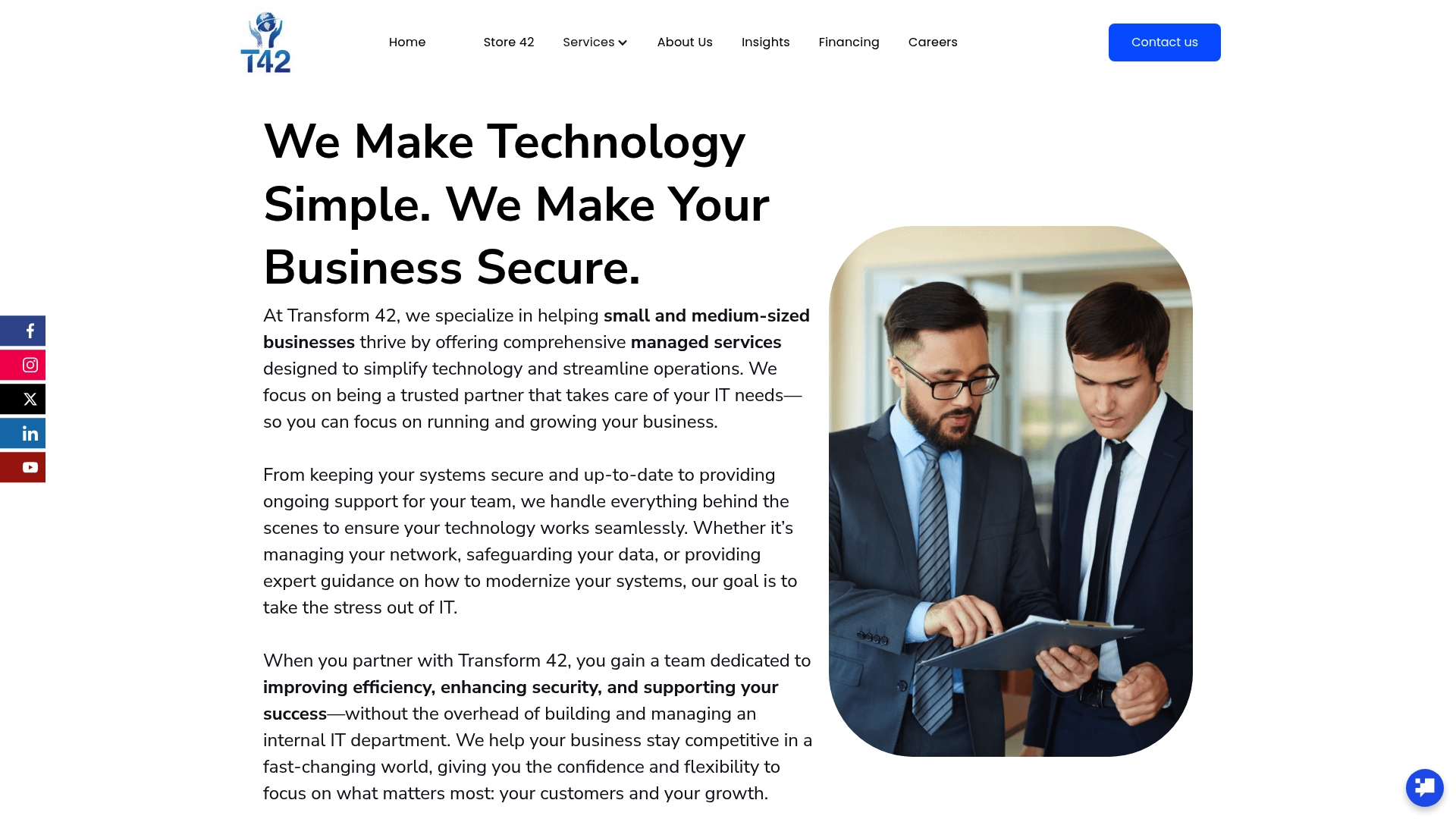Business digitalization is changing how companies work from the ground up. Only 30 percent of organizations succeed when they try to go fully digital. Sounds risky, right? But that low number is not a sign to avoid digitalization. It means the businesses that figure it out can leap ahead of everyone else.
Quick Summary
TakeawayExplanationBusiness digitalization is transformativeIt fundamentally changes how organizations operate and deliver value through integrated digital strategies.Embrace advanced technologies for efficiencyAdopting tools like cloud computing and data analytics optimizes processes and enhances decision-making.Culture shift is essential for successOrganizations must adapt their mindsets and practices to fully leverage digital innovations and reap benefits.Focus on customer experience improvementDigitalization helps create tailored customer interactions, enhancing engagement and satisfaction.Continuous adaptation is crucialOngoing commitment to technological and process evolution ensures businesses remain competitive in a digital world.
Defining Business Digitalization: What It Means
Business digitalization represents a profound transformation where organizations integrate digital technologies comprehensively into their core operational strategies. This process goes beyond simply using digital tools and instead fundamentally reimagines how businesses create value, interact with customers, and optimize internal processes.
Core Components of Business Digitalization
At its essence, business digitalization involves three critical dimensions that reshape organizational capabilities:
- Technology Integration: Implementing advanced digital systems and platforms that replace traditional analog processes
- Strategic Reimagination: Developing new business models that leverage digital capabilities
- Cultural Adaptation: Transforming organizational mindsets to embrace technological innovation
According to McKinsey, digitalization is not just about technology adoption but about creating fundamental changes in how organizations deliver value. This means rethinking existing workflows, customer engagement strategies, and operational frameworks through a digital lens.
Below is a table summarizing the core components of business digitalization, with concise definitions for each dimension to help clarify their distinct roles.
Core ComponentDescriptionTechnology IntegrationAdoption of advanced digital systems and platforms to replace traditional analog processesStrategic ReimaginationCreating new business models that leverage digital capabilities for greater valueCultural AdaptationShifting organizational mindsets and practices to embrace technological innovation
Understanding Digital Transformation Mechanics
Business digitalization operates through systematic approaches that convert analog processes into digital ecosystems. This transformation typically involves:
- Converting paper-based documentation into digital repositories
- Implementing cloud-based collaboration platforms
- Utilizing data analytics for strategic decision making
- Automating repetitive operational tasks
The goal is not merely technological replacement but creating more agile, responsive, and efficient organizational structures. Digital technologies enable businesses to collect real-time data, make faster decisions, and create more personalized customer experiences.
By embracing digitalization, organizations can unlock unprecedented opportunities for innovation, efficiency, and competitive advantage in an increasingly technology-driven global marketplace.
The Importance of Business Digitalization: Why It Matters
Business digitalization has emerged as a critical strategy for organizations seeking sustainable growth and competitive advantage in a rapidly evolving technological landscape. Far from being a passing trend, digital transformation represents a fundamental shift in how businesses operate, compete, and deliver value to customers.
Economic and Strategic Advantages
Digitalization provides businesses with transformative opportunities to reimagine their operational models. According to research from the Bipartisan Policy Center, digital tool adoption is strongly correlated with small business performance and economic expansion.
Key economic benefits include:
- Enhanced operational efficiency
- Reduced operational costs
- Improved decision making through data analytics
- Expanded market reach and customer engagement
Competitive Survival in a Digital World
Modern businesses face unprecedented technological disruption. Organizations that fail to embrace digitalization risk becoming obsolete. Digital technologies enable businesses to:
- Respond quickly to market changes
- Develop more personalized customer experiences
- Create innovative business models
- Streamline complex operational processes
Research indicates that only 30% of companies successfully navigate digital transformation, underscoring the complexity and critical nature of this strategic imperative. Digitalization is not simply about implementing new technologies but fundamentally reimagining organizational capabilities and customer interactions.
By proactively embracing digital transformation, businesses can position themselves as adaptive, forward-thinking enterprises capable of thriving in an increasingly complex and technology-driven global marketplace.
How Business Digitalization Works: Key Processes Explained
Business digitalization transforms organizational operations through systematic technological integration, converting traditional analog processes into dynamic digital ecosystems. This comprehensive approach involves strategic planning, technological implementation, and continuous organizational adaptation.
Digital Infrastructure Development
The foundation of business digitalization begins with building robust digital infrastructure. Organizations must carefully assess their existing technological capabilities and design comprehensive digital transformation strategies that align with their specific business objectives.
Critical infrastructure components include:
- Cloud computing platforms
- Advanced data management systems
- Secure network architectures
- Integrated communication technologies
According to Deloitte, successful digital infrastructure development requires a holistic approach that considers technological capabilities, organizational culture, and strategic alignment.
Process Automation and Optimization
Digitalization fundamentally reimagines business processes through advanced automation technologies. This involves identifying repetitive tasks, implementing intelligent software solutions, and creating streamlined workflows that enhance operational efficiency.
Key automation strategies include:
- Implementing robotic process automation (RPA)
- Utilizing artificial intelligence for decision support
- Developing machine learning algorithms
- Creating integrated data analytics platforms
By systematically converting manual processes into digital workflows, organizations can dramatically reduce operational costs, minimize human error, and create more responsive business environments. The goal is not merely technological replacement but fundamental process reinvention that unlocks new levels of organizational performance.
Digital transformation represents a continuous journey of technological adaptation, requiring ongoing commitment, strategic vision, and a willingness to embrace innovative approaches to business operations.
Essential Concepts in Business Digitalization: Technologies and Trends
Business digitalization continues to evolve rapidly, driven by emerging technologies that fundamentally reshape how organizations operate, communicate, and create value. Understanding these essential concepts provides insights into the strategic technological landscape transforming modern business environments.
This table outlines foundational digital technologies and emerging trends discussed in the article, highlighting key technologies business leaders should understand for successful digital transformation.
CategoryKey Technologies/TrendsFoundational TechnologiesCloud computing systems, AI platforms, IoT networks, data analytics frameworks, cybersecurity infrastructureEmerging Technological TrendsMachine learning, blockchain, robotic process automation, edge computing, AR/VR platforms
Foundational Digital Technologies
Modern business digitalization relies on a complex ecosystem of interconnected technological platforms that enable comprehensive organizational transformation. These technologies serve as critical infrastructure for digital innovation and operational efficiency.
Key foundational technologies include:

- Cloud computing systems
- Artificial intelligence platforms
- Internet of Things (IoT) networks
- Advanced data analytics frameworks
- Cybersecurity infrastructure
According to EDUCAUSE, digital transformation involves applying internet-era practices and technologies to meet evolving business and customer expectations.
Emerging Technological Trends
Businesses are increasingly adopting sophisticated digital technologies that enable more dynamic, responsive, and intelligent operational models. These emerging trends represent significant opportunities for organizational innovation and competitive differentiation.
Critical emerging technological trends encompass:
- Machine learning and predictive analytics
- Blockchain and distributed ledger technologies
- Robotic process automation
- Edge computing systems
- Augmented and virtual reality platforms
The convergence of these technologies creates unprecedented opportunities for businesses to reimagine traditional operational approaches, develop more personalized customer experiences, and create innovative value propositions that transcend conventional business models.
Successful digital transformation requires a strategic approach that integrates technological capabilities with organizational culture, ensuring that digital investments align closely with broader business objectives and market dynamics.
Real-World Applications of Business Digitalization: Success Stories
Business digitalization transforms theoretical concepts into tangible outcomes across diverse industries, demonstrating the profound impact of strategic technological integration. Successful digital transformation goes beyond technological implementation, requiring comprehensive organizational reimagination and innovative thinking.
Corporate Digital Transformation Strategies
Leading organizations worldwide have demonstrated remarkable success by embracing digital technologies as core strategic assets. These transformative approaches enable businesses to create more responsive, efficient, and customer-centric operational models.
Notable digital transformation strategies include:
- Developing integrated digital customer experience platforms
- Implementing enterprise-wide data analytics systems
- Creating agile technological infrastructure
- Establishing cross-functional digital innovation teams
According to Hospitality Insights from EHL, successful digital transformation requires organizations to rapidly adapt and deliver innovative solutions across complex operational environments.
Industry-Specific Digital Success Examples
Different sectors showcase unique approaches to digital transformation, highlighting the versatility and potential of technological integration. From healthcare to education, organizations are leveraging digital technologies to solve complex challenges and create unprecedented value.
Industry-specific digital transformation highlights include:

- Healthcare providers using telemedicine platforms
- Educational institutions developing comprehensive online learning systems
- Manufacturing companies implementing IoT-enabled smart factories
- Financial services creating seamless digital banking experiences
These real-world applications demonstrate that business digitalization is not a one-size-fits-all approach but a nuanced strategy tailored to specific organizational needs, market dynamics, and technological capabilities.
Ready to Turn Business Digitalization Into Tangible Results?
If you are feeling overwhelmed by outdated processes and the pressure to adopt digital tools, you are not alone. Many small and medium businesses struggle to keep up with rapid technological change and often wonder how to move from understanding digitalization concepts to actually making their business more agile and competitive. The article explains the need for technology integration and cultural adaptation, but putting these ideas into action can feel daunting without a trusted partner.

Transform 42 Inc. bridges the gap between knowledge and execution. We deliver proven digital transformation support and ongoing managed IT services designed for growing organizations just like yours. Now is the time to secure your future and outpace your competitors. Visit Transform 42 Inc. to see how your business can thrive in a digital-first world. Connect with our experts today and start your journey toward smarter, more efficient operations.
Frequently Asked Questions
What is business digitalization?
Business digitalization refers to the comprehensive integration of digital technologies into an organization’s core operational strategies, fundamentally reimagining how businesses create value and interact with customers.
Why is business digitalization important?
Digitalization is crucial for sustainable growth and competitive advantage, as it enhances operational efficiency, reduces costs, and helps organizations adapt to rapidly changing market conditions.
What are the key components of business digitalization?
The key components of business digitalization include technology integration, strategic reimagination of business models, and cultural adaptation to embrace technological innovation.
How does business digitalization transform operational processes?
Digitalization transforms operational processes through automation, converting analog tasks into digital workflows, and implementing advanced technologies, which leads to increased efficiency and reduced operational costs.





